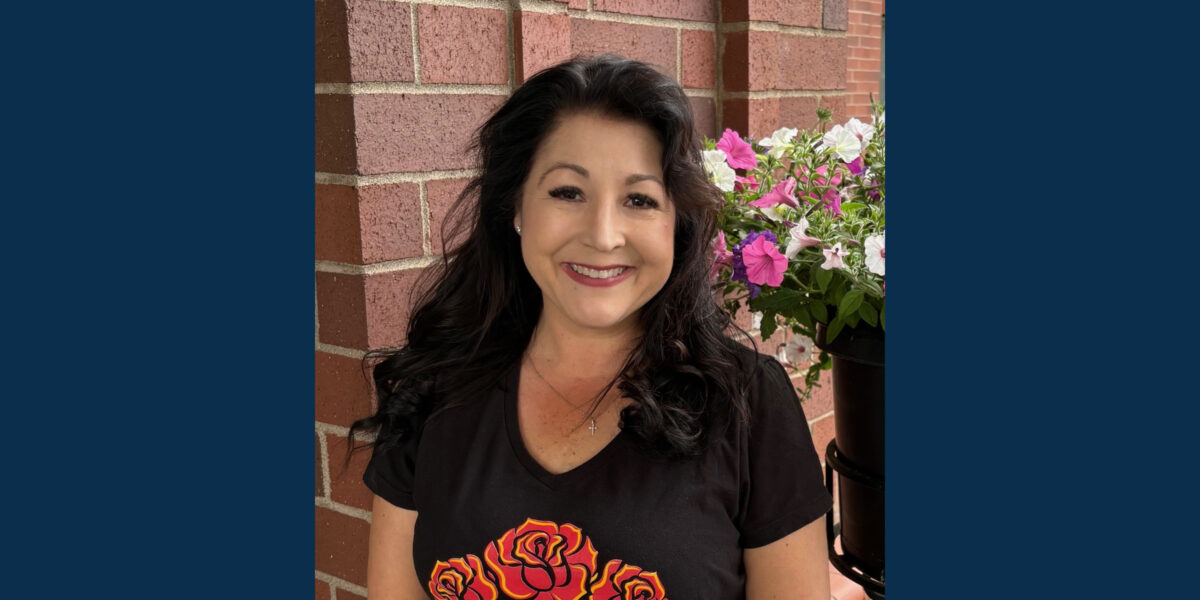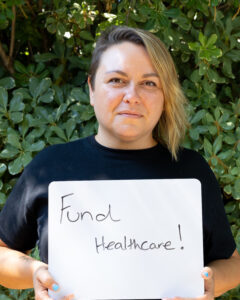

Mental Health Talent Pipeline Spotlight: Meet Leslie Guerrero Mendoza
3 min read. Leslie Guerrero Mendoza describes the journey that led her to the Mental Health Talent Pipeline.
Born in Santa Rosa, Leslie Guerrero Mendoza moved with her family to Windsor when she was in second grade and she has lived there ever since. “What I most enjoy about northern Sonoma County is that even as it’s getting bigger it still feels homey and small,” she says. “And I’m so blessed to have most of my family living here. That keeps me here, too.”
The first person in her family to go to college, Leslie graduated this year from UC Davis with a degree in sociology. In August, with support from a Mental Health Talent Pipeline scholarship, Leslie entered USF Santa Rosa’s graduate program in counseling psychology.
Leslie credits her upbringing with her passion for education. She says it also sparked her commitment to social justice.
“Growing up with a single mom who does not speak any English means there are a lot of issues around access and equity you face,” she explains, “in regard to getting Medi-Cal or making appointments, for instance. By the time I was 12 or 13, when my mom needed help, I took on that role—helping her fill out forms, going with her to her appointments. I was her advocate.”
LLeslie notes that her path to a career as a mental health professional has more than one inspiration but began to take a definite shape after she transferred from city college to UC Davis.
“I was able to take electives that corresponded to my major, so I took psychology classes and classes involving health and wellness, including mental health. That opened up the path. It was really fascinating,” she recalls. “In terms of mental health services, I understood that a lot of people were in need and I wanted to join those who could help. I felt I had the potential to be in the field of mental health and work with families or kids and make a positive difference in their lives.”
Having herself received the support of a therapist when she was just entering her teenage years, Leslie says that experience had left her with an intimate understanding of the positive role a therapist can play.
“I understood that a lot of people were in need and I wanted to join those who could help. I felt I had the potential to be in the field of mental health and work with families or kids and make a positive difference in their lives.”
Leslie Guerrero Mendoza
“One of the role models that has allowed me to choose this career path was my first therapist,” she avers. “She helped me for about a year when I was struggling with depression, anxiety, and having panic attacks. She made me feel so safe and secure and comfortable. She really understood me. And she was bilingual, which I really liked, because there were things I wanted to say in Spanish.
“Through her I was able to learn ways to shift away negative thoughts and to alleviate these panic attacks through deep breathing and other methods—I thought, wow, this is incredible! Later, as I got older and had other challenges come up, I would enroll myself in therapy. I feel that every time I did I became a better version of myself through the process, because I learned more about myself and became more self-aware.”
Another guide on the path to the master’s program at USF Santa Rosa has been her mentor.
“I’ve been working with her throughout my schooling,” explains Leslie. “Last year, she sent me an article about the Mental Health Talent Pipeline scholarship. She thought I should read it, since it was the story of a young woman in Healdsburg who received the scholarship and who has a similar background to me. ‘It might inspire you to apply to this program after you graduate from UC Davis,’ she told me. I read the article and was really impressed,” says Leslie.
“I did more research on USF. I felt I aligned with the social justice goals of the school, again, because of my own personal experiences. And I realized they offered the program at the Santa Rosa Junior College. I thought this was perfect, not only because it would be an easy commute, but also because I love the Junior College. I know the campus very well. I went there for a couple of years after high school and even when I was at Davis, there were times when I would come back home and use the SRJC library. I’ve always loved that library. So it seemed a perfect fit. I’m glad to say I got accepted, and here we are.”
A few months into her coursework, Leslie affirms that the experience so far has been deeply rewarding. “I’ve been learning a lot,” she says. “I really like that it’s a small, intimate-sized class because you’re able to make connections to the other students and also the professor. And I had an epiphany last week during a lecture. I even took a note of it so I can work on it when I next enroll in therapy. Learning about myself in class is really wonderful.”
“I’ve struggled with my own mental health and I’ve also succeeded with the mental health services I’d received,” says Leslie. “I feel this is a good path to be on. I was helped, and I believe I can help other people who need it. As a bilingual Latina, I want to give back to my community by providing therapeutic services, including to those who may not know how to fully express themselves in English.”

Related News + Stories
Invest in Our Community
Your support is vital to our collective vision of eliminating health inequities in northern Sonoma County.
Donate



